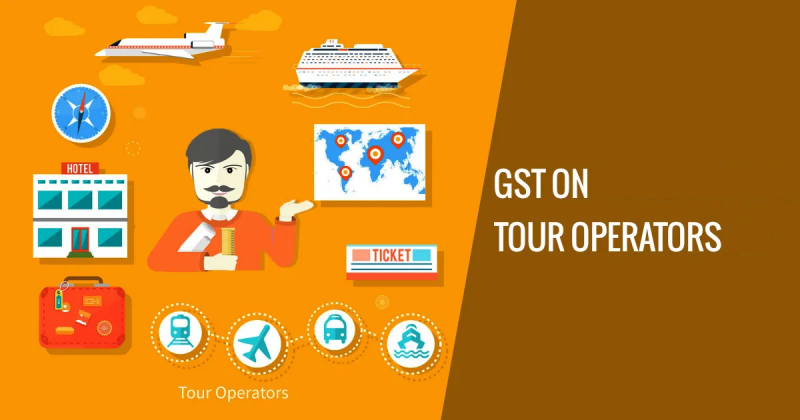
GST on Tour Operator Services
‘Tour Operator’ shall mean any person engaged in the business of planning, scheduling, organizing, arranging tours (which may include arrangements for accommodation, sightseeing or other similar services) by any mode of transport, and includes any person engaged in the business of operating tours. The definition is provided by the Explanation in Heading 9985 of GST Tariff Act, 2017.
For example, Make my Trip, Expedia etc. These companies provide a complete package of tour which includes Boarding & Lodging, Transportation, Local Sightseeing, Guides etc. Now a days, this business has become purely an E-commerce business and all the big companies have their own web portal and mobile app.
Come the new idea of businesses, come more challenges with more complexity and opportunity. With this article an effort is made to descript the Services of Tour Operator under the aegis of Indian GST Laws.
As per Heading 9985 of GST Tariff Act, 2017, The rate of GST would be 5% (2.5% CGST+2.5% SGST) provided following conditions are met,
1. Input tax credit on services availed by the entity will not be available. However, Input Tax Credit on the services taken from other Tour Operator are allowed.
2. The entity shall indicate in its invoice that the amount charged is gross amount and inclusive of charges of accommodation and transportation
Therefore, if an entity offers a package to a customer for let’s say Rs. 1,05,000/- inclusive of everything, then the invoice shall be generated for Rs. 1,05,000/- (Rs. 5,000/- being CGST & SGST) and entity has to specifically mention in invoice that amount includes accommodation and transportation etc. No input tax credit on services like hotels, air tickets etc. will be available to the entity. However, Input Tax Credit may be taken on the tour operator services procured from another tour operator.
On the other hand, the entity may charge GST at the rate of 18% (9% CGST+9% SGST) on the total amount. In that case, the entity will be eligible to take all input tax credit like rent, professional fee, lease line, telephone etc. on the services that the entity acquired for providing the underlined services i.e. Tour Operating.
However, most of the input tax credit will not be available to the entity due to the nature and place of supply of those services which are taken by the entity. The main expenditure that entity will occur would be of Boarding & Lodging and Hotel booking. In case of Hotel booking, the place of supply would be the location where the hotel is situated and thus the hotel will charge CGST & SGST on the invoice. If the entity is not registered under GST in the state where the hotel is situated, the entity cannot take the input tax credit on that particular invoice. Same goes with flight tickets. The place of supply in case of air fare, would be the place from where the flight embarks and in case the entity does not have registration under GST in the state from where such flight take-off, the entity cannot take input tax credit of that invoice too.
Let’s understand the situation with an example. Suppose, a customer from Delhi approaches Tour Operator which is situated and registered in Bangalore, Karnataka for a complete package of 5D/6N tour to Kerala. The entity quotes Rs. 1,00,000 (Excluding GST) for the tour. The breakup of the charges is as follows,
In this case, entity can opt either to pay 5% GST (IGST) on Rs. 1,00,000/- i.e. Rs. 5,000/- and avail no input tax credit or to pay 18% GST (IGST) and may avail input tax credit. But the entity is not eligible to take input tax credit on Air fare and Hotel charges as the place of supply, in case of Hotel, would be Kerala and in case of Air fare, it would be in Delhi. However, if the entity get itself registered in Kerala and Delhi, then it is possible for the entity to take input tax credit for these services also but that seems quite unfeasible considering the compliance burden which will be increased for the entity.
Further, in this case the entity must raise an invoice indicating specifically that the amount charged is gross amount and inclusive of charges of accommodation and transportation.
Though, most of the companies do operate as Tour Operator services, the entity may either provide services as an agent and charge commission on its service and take reimbursement in actual for the expenses that entity incurred for providing such services. Generally, small business entity opts for this model as in this model, the entity must pay tax only on the commission that it charges and not whole amount which is not even its revenue.
The entity may also opt to provide the underlined services on commission basis. In that case, the service will be categorized as ‘Intermediary’ and services like Boarding & Lodging etc. will be taken by the entity on behalf of customer. The entity will act as ‘Pure Agent’ and take reimbursement on actual basis from the customer.
As per section 2(13) of IGST Act, 2017,
“Intermediary” means a broker, an agent or any other person, by whatever name called, who arranges or facilitates the supply of goods or services or both, or securities, between two or more persons, but does not include a person who supplies such goods or services or both or securities on his own account”
And as per the Explanation to Rule 33 of CGST Rules, 2017,
“Pure agent” means a person who—
enters into a contractual agreement with the recipient of supply to act as his pure agent to incur expenditure or costs in the course of supply of goods or services or both;
neither intends to hold nor holds any title to the goods or services or both so procured or supplied as pure agent of the recipient of supply;
does not use for his own interest such goods or services so procured; and
receives only the actual amount incurred to procure such goods or services in addition to the amount received for supply he provides on his own account.”
In this case, the entity has to enter into an agreement with the customer to act as his pure agent and authorize itself to incur the expenses for services like Hotel, Taxi etc. on behalf of customer. The entity, in this case, will charge its commission (whatever agreed) from the customer and will take reimbursement of the expenses on actual basis which it incurred on behalf of customer.
Let’s understand this with our previous example. In that case, if the entity enters into an agreement with the customer to act as pure agent, then the entity will charge GST at the rate of 18% on Rs. 10,000/- only i.e. Rs. 1,800/- and will take reimbursement of Rs. 90,000/- as actual expense incurred on behalf of the customer.
However, in this model, there are certain conditions which needs to be complied with. As per Rule 33 of CGST Rules, 2017,
“Notwithstanding anything contained in the provisions of this Chapter, the expenditure or costs incurred by a supplier as a pure agent of the recipient of supply shall be excluded from the value of supply, if all the following conditions are satisfied, namely, —
the supplier acts as a pure agent of the recipient of the supply, when he makes the payment to the third party on authorization by such recipient;
the payment made by the pure agent on behalf of the recipient of supply has been separately indicated in the invoice issued by the pure agent to the recipient of service; and
the supplies procured by the pure agent from the third party as a pure agent of the recipient of supply are in addition to the services he supplies on his own account”
Taking the previous example further, the entity has to raise an invoice for Rs. 10,000/- and add 18% GST thereupon and will indicate separately in the invoice for the payment made by the entity as pure agent on behalf of the customer.
In case the entity takes services of any other Tour Operator, let’s say for planning the itinerary for the customers for particular packages, the entity can take input tax credit regardless of his choice to act as Tour operator or Agent.
For better understanding, let’s continue with the example cited above. In that case, let’s say 25% is the fixed charges for the other Tour Operator which will come out to be Rs. 2,500/- (on Rs. 10,000/-). Now, the other Tour Operator shall charge GST at the rate of 5% (i.e. Rs. 125/-). In this case, the entity can take input tax credit of Rs. 125/- even if the entity has opted to pay tax at the rate of 5% on the total amount.
The GST shall be charged and paid at the time of payment or invoice whichever is earlier. Therefore, for the purpose of GST, the entity shall recognize its revenue on the payment basis.
However, if the entity opts to act as ‘Pure Agent’ the GST shall be charged when the final invoice is raised or the receipts of the commission whichever is earlier.


